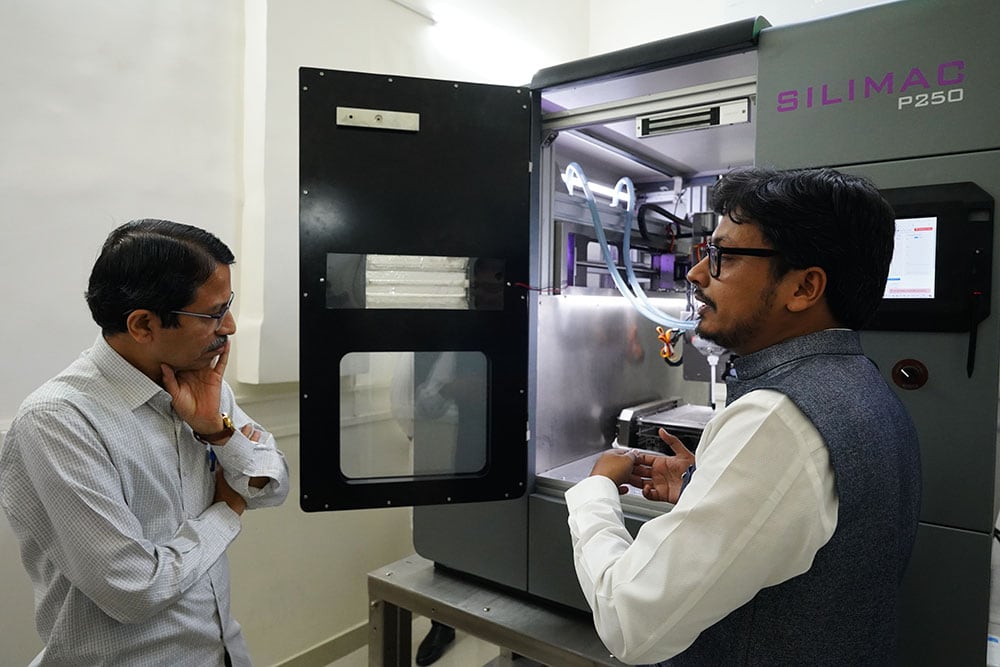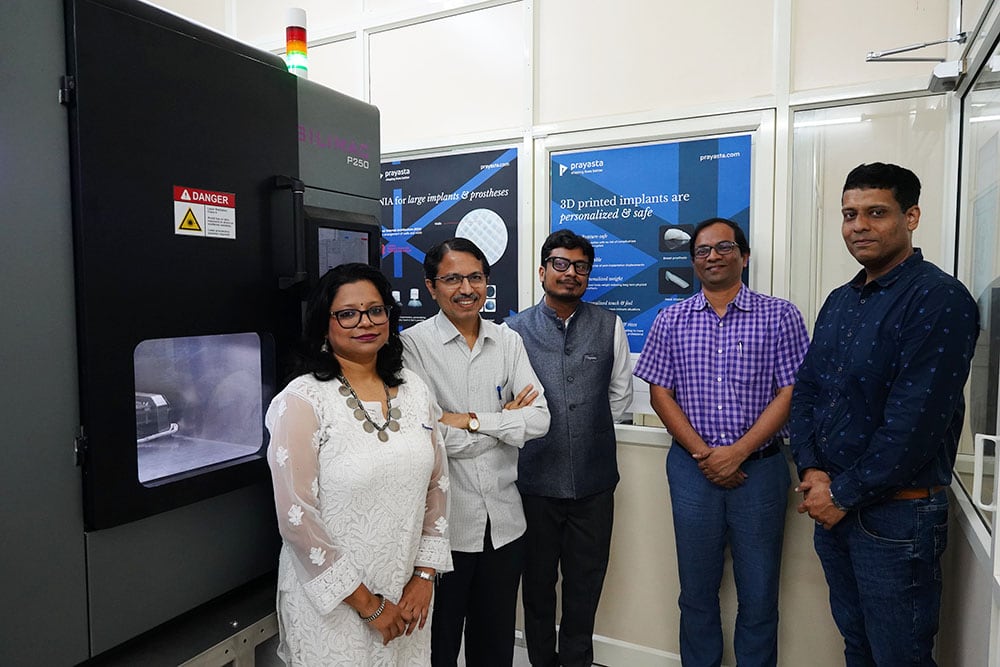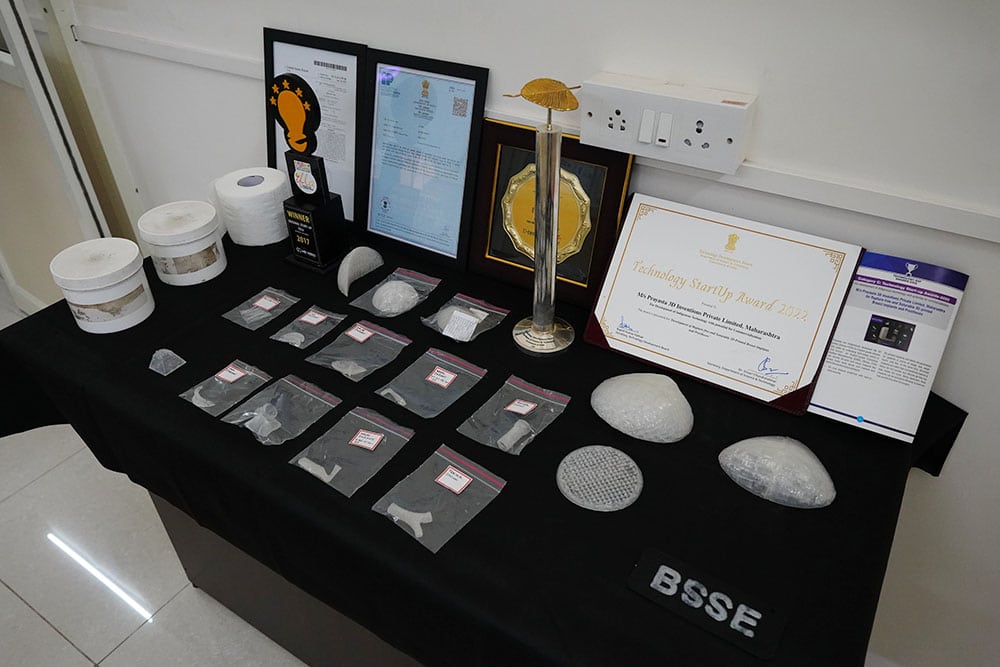The partnership between Prayasta and IISc aims to accelerate the translation of personalized implants for soft tissues including for breast from research labs to hospitals.
Prayasta also this year’s National Start-up Technology Award winner start-up, has developed world’s first 3D printer for implant-grade silicone and is partnering with the Centre for BioSystems Science and Engineering (BSSE) at the Indian Institute of Science (IISc). An MoU was signed to formalise this partnership earlier this year.

Prayasta’s specialized 3D printer, Silimac, can directly 3D print implant-grade silicone material to make an implant within the hospital itself. 3D printing allows personalization of implants on a one-to-one basis which not only improves outcomes of the surgeries for the patients but also reduces the average time a surgeon must spend for achieving the same results using standard implants.
3D printed implants that are prepared using Silimac can be personalized not only in terms of shape, size, and contour but also in terms of weight, stiffness, touch and feel making it a complete solution. As the world is moving towards personalized medicine, personalizing implants makes even more sense as implants are going to be there in patients’ bodies permanently for the rest of their lives. Prayasta has also developed a design methodology called Novel Internal Architecture using which they can make breast implants rupture-proof and suturable eliminating the risk of leakage and post-implantation displacements respectively. Although Silimac and Novel Internal Architecture were initially developed to make breast implants, the technology can be extended to other soft tissue implants such as nasal, ear, chin, malar, lip, tracheobronchial, oesophageal, etc. and also to external prostheses for soft tissues.
Prayasta and IISc will work together to accelerate the translation of personalized soft tissue implants from research to hospitals, to test the 3D printability of novel materials in a fast-track mode and also to develop the necessary skills for faster market penetration of 3D printing technology.
Vikas Garg, Cofounder, Prayasta stated, “Silicone is one of the best implantable materials today and yet not 3D printable. Conventional printers cannot handle implant-grade silicone due to its inherent two-part requirement for cross-linking, form factor and extremely high viscosity. That is why, we have taken a fresh approach and developed a novel 3D printing technology from scratch.”
“We are excited to join hands with Prayasta as it offers a production-ready 3D printing technology for elastomers such as silicone, and can positively impact the quality of healthcare delivery,” said Prof Navakanta Bhat, Dean, Division of Interdisciplinary Sciences, IISc.
“It’s an absolute honour to partner with one of the most premier science institutes in India. We look forward to creating the future of better and personalized healthcare solutions together,” added Shilpi Sen, Cofounder, Prayasta.

About Prayasta:
Prayasta was founded by Vikas Garg and Shilpi Sen in 2017 in Bangalore with the belief that implants should be made to fit people rather than fitting people into limited sizes of implants. Prayasta has been supported by various grants including from Department of Science & Technology (DST), Biotechnology Industry Research Assistance Council (BIRAC), Ministry of MSME (MoMSME), Ministry of Electronics and Information Technology (MEITY), Start-up Karnataka and also National Research development Corporation (NRDC). Prayasta has also received this year’s National Start-up Technology Award from Technology Development Board (TDB) and has been granted patents in India and USA for their technology.
About BSSE:
The Centre for BioSystems Science and Engineering (BSSE) at the Indian Institute of Science (IISc) was founded in 2015, with a vision to develop and apply interdisciplinary approaches for understanding and manipulating biological systems. Since its inception, the Centre has been running a successful PhD programme in the broad area of Bioengineering. The programme was expanded to clinician-scientists, in collaboration with leading medical centres in the country. A new MTech programme in Bioengineering has been initiated in 2022. Research at the Centre spans a spectrum of areas at the interface of biology and the physicochemical sciences, with a focus on problems of importance to clinicians and industry.
Subscribe to AM Chronicle Newsletter to stay connected: https://bit.ly/3fBZ1mP
Follow us on LinkedIn: https://bit.ly/3IjhrFq
Visit for more interesting content on additive manufacturing: https://amchronicle.com


